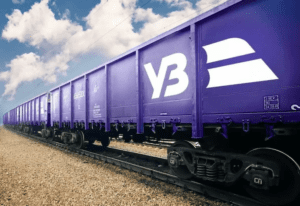Volumes of cargo transportation in 2021, mln tons


In August, Ukrzaliznytsia increased the volume of cargo transportation by 4.5%, from 10.318 million tonnes to 10.787 million tonnes, Oleksandr Kamyshin, head of the company’s board, said on Telegram on Thursday evening.
“There is a significant increase in grain, our strategic position. Up to 42% was transported, primarily due to the unblocking of seaports,” he wrote.
According to information provided by Kamyshin, 2.088 million tonnes were transported in August compared to 1.447 million tonnes in July.
In addition, the transportation of oil products increased by 2.6%, to 556,000 tonnes, and construction materials – by about 10%, the head of the board of Ukrzaliznytsia said.
According to him, the transportation of iron ore decreased by 6.8%, to 1.895 million tonnes, as well as ferrous metals – by 10%.
“But here the reason is clear – unfortunately, the decline in steel production in the world continues. But the decrease in coal transportation by 10% really worries me,” Kamyshin said.
He stressed that Ukrpzaliznytsia was fighting for every tonne of cargo and increasing the export-import potential of the railway by building new sections, opening new junctions with neighboring countries and increasing the capacity of western crossings.

From September 1, 2022, Ukrainian carriers will be able to travel to Moldova under new simplified rules, according to the official Facebook page of the Ministry of Infrastructure of Ukraine.
“After the signing of the “transport visa-free regime” with the countries of the European Union, Moldova remained the only state on our borders with which the permit regime for Ukrainian carriers was not completely abolished. Given the large volume of cargo that is now going towards Moldova, the signing of a bilateral protocol removes the risk of stopping our exports,” the ministry stressed.
The permit regime will be maintained for non-scheduled passenger traffic (next year, the parties will exchange 2,200 permits) and for traffic to or from third countries (Ukraine will receive 10,000 permits by 2023).
“Bilateral cancellation of permits for international freight transportation, the opening a few days ago of the Berezyne-Basarabeasca railway section, which has not been operating for more than 20 years, are excellent examples of cooperation in the transport sector, strengthening interaction between Ukraine and Moldova. Now our task is to make the most of new opportunities for strengthening the economies of our countries in the face of the threats posed by Russian military aggression and Russian policy in general,” Infrastructure Minister of Ukraine Oleksandr Kubrakov said.

JSC “Ukrzaliznytsia” transported 10.302 million tons of cargo in July, which is 9.2% more than in June this year.
“Domestic transportation, exports and imports have grown. Only transit has not grown, because it is practically non-existent. The transportation of most of our key cargoes has increased: grain, ore, coal, ferrous metals, diesel, building materials, etc. Vehicle transportation has dipped , coke, scrap metal, salt and oil,” Alexander Kamyshin, head of the railway company, wrote on his Telegram channel on the evening of August 1.
According to the data he provided, in July 2022 UZ transported 542 thousand tons of oil and oil products (an increase of 12.2%), 2.033 million tons of ore raw materials (+3.2%), 1.462 million tons of grain (+7.2% ) and 6.266 million tons of other cargoes (+11.6%).
“Yes, the growth is slow. We are doing everything possible for the constant growth of freight traffic, primarily export cargo. I hope that the unblocking of seaports for grain will help us increase grain exports faster,” Kamyshin said.
In domestic traffic, UZ transported 6.2 million tons in July, which is 10.5% more than in June this year.
3.4 million tons of cargo were transported for export, which is 8.7% more than a month earlier.
UZ also transported 598.8 thousand tons of imported cargo in July, which is 4.5 more than in June 2022.

Associations of Ukrainian manufacturers call on the Ministry of Infrastructure of Ukraine to introduce a moratorium on raising tariffs for rail freight for the period of martial law and 6 months. after its termination.
“There was no real discussion between shippers and the carrier about a compromise solution to increase tariffs – we were simply presented with a fact. When Ukrzaliznytsia announced the discussion of raising tariffs by 70%, the order to increase tariffs had already been signed. We had specific proposals: to introduce a moratorium for the period of martial law and 6 months after on the increase in tariffs within the borders of Ukraine, and all related services,” said Ludmila Kripka, executive director of the Ukrcement association, at a press conference at the Interfax-Ukraine agency on Thursday.
According to her, UZ did not take into account the transportation of raw materials, coal, fillers in the infrastructure component of transportation, and did not include the tariff distance, which is why the cost of the final product will increase more significantly than in the carrier’s forecast.
“The impact on the cost of the final product will be much higher than presented by UZ. On the example of cement: for us, the main raw material is limestone, and there the highest figure is 55%. Other industries fell into the values of 0-13%,” Kripka said.
In addition, from August 1, the calculation for the use of wagons will be changed to the actual one instead of the planned one, which will also increase the costs of shippers due to delays in border crossings, the expert noted.
Oleg Misyuk, a representative of the Ukrainian Association of the Limestone Industry, pointed out that the decision to raise tariffs would have a significant impact on the lime market, which is already undergoing a significant decline in production volumes.
“Before the war, the cost of delivery from the west of Ukraine to the Dnieper was 400 UAH per ton, now it is 650 UAH. With a producer price of up to 300 UAH / t, the consumer overpays another 200-250 UAH from July 1. In general, lime production has fallen from pre-war 1, 2 million tons per month to 350 thousand tons in May-June. The decision of UZ to increase tariffs will hit the market even harder, we expect a fall by another 30-40%,” he said.
The expert also noted that the increase in tariffs may put Ukrainian lime producers in a non-competitive position in front of foreign companies interested in entering the Ukrainian market.
At the same time, the increase in the cost of logistics for grain exporters, coupled with the blocking of Ukrainian ports, can play a decisive role in the bankruptcy of most agricultural producers, says Nikolai Gorbachev, president of the Ukrainian Grain Association.
“With this increase in tariffs, the logistics to the port of Constanta in Romania is already $180. The price for a loaded vessel is about $240 per ton. Thus, the agricultural producer needs to sell barley from the elevator for $50-60. The cost of growing it is more than $160. He will not receive even a third of his costs, so he will not carry out any sowing campaign in August. This will lead to the bankruptcy of most agricultural producers,” he said.
The Ukrainian Association of Ferroalloys and Other Electrometallurgical Products also opposed the increase in tariffs.
“Ferroalloys are cargo of the third tariff class, and are transported by rail only accompanied by guards paid by the hour. And given the change in the logistics of transportation due to the war, cargo in some directions is on the road 9-10 times longer than before the war” – explained the head of the association Sergey Kudryavtsev.
Meanwhile, transportation of ferroalloy products was cost-effective for UZ even with tariffs before the increase, he added.
Metallurgical enterprises are currently not operating at full capacity, many of them have been stopped and destroyed, while they continue to pay wages to workers, said Alexander Kalenkov, head of the Ukrmetallurgprom association.
Volumes of cargo transportation in 2021, mln tons
